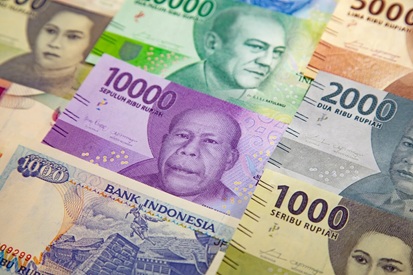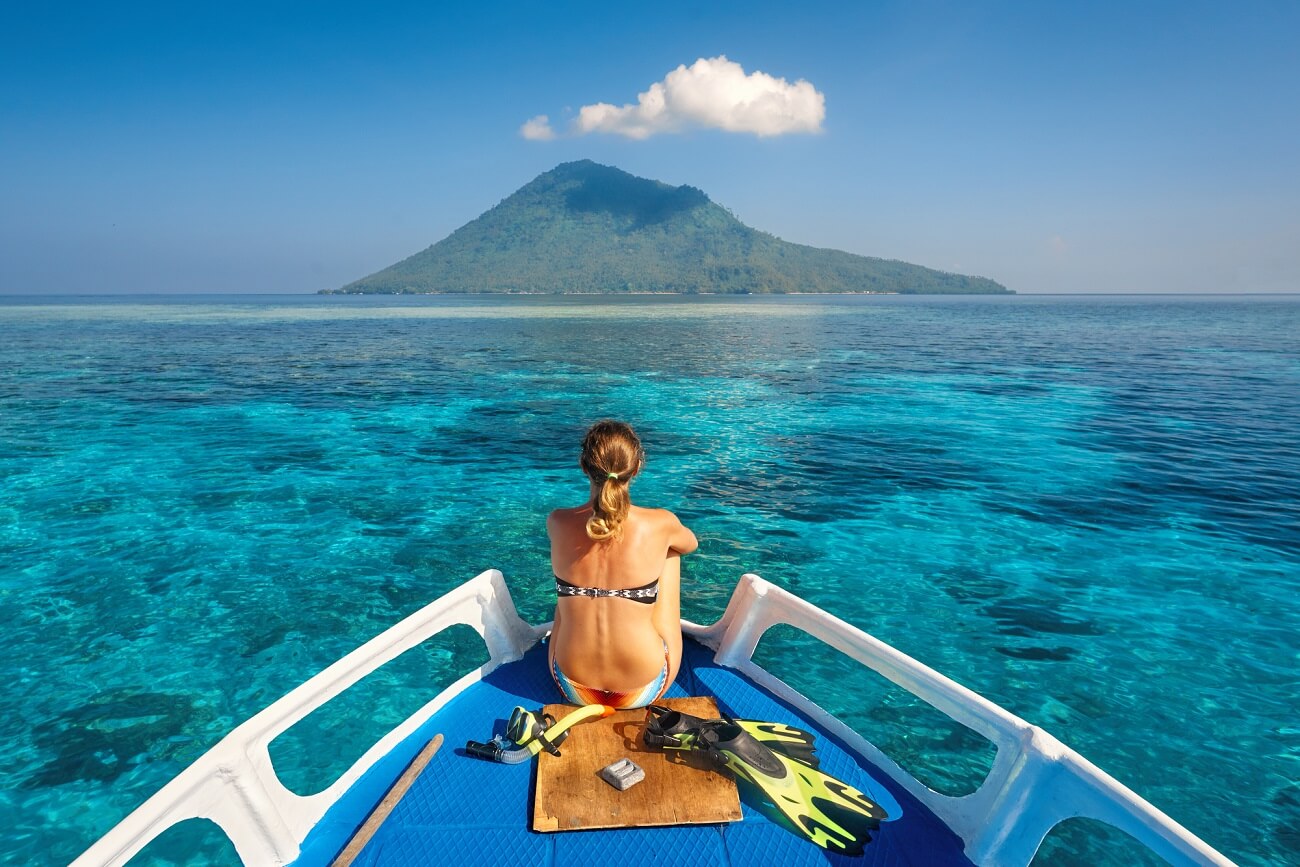

Jakarta is a city of contrasts. Luxury boutiques and restaurants coexist on neighbouring streets with poverty and misery. Many nationalities of the world are present here, and different languages are heard on the streets.
Beautiful beaches, luxurious shopping malls, a mixture of architectural monuments of different cultures and eras, an active nightlife have made Jakarta so attractive for those who want to see a different civilization - a life different to European. Tourists definitely have something to do in Jakarta.

Depositphotos
When to go to Jakarta
Subtropics prevail in Jakarta, which bring comfortable temperatures the whole year.
Summer is dry. On average, the temperature outside is up to +32 ºС, but it can be higher. Outside of the summer season, it rains in Jakarta, and the humidity is almost 75%. There is no winter as such in Jakarta. It is warm, and the temperature is rarely below +27 ºС. You can forget about a beach holiday and prepare for the rains. Although you can swim in the sea the whole year, it is always warm.
Therefore, the best time to explore the beauties of Jakarta is summer.

Depositphotos
Districts of Jakarta: where to go
Jakarta is a province that has received the status of the capital. It is divided into 5 municipalities, and each has its own "highlight".
- Central Jakarta. The main tourist locations are concentrated here. Just the central streets are filled with colonial architecture. Dutch were the first who built the city. However, the city layout was rather reminiscent of the British style: spacious areas such as Medan Merdeka (Freedom Square) and Lapangan Banteng. The European part combines wonderfully with the Eastern style, or "indish" style, as the Dutch call it, including an abundance of spacious gardens and landscape of the streets. Visit museums, see the diversity of cathedrals and mosques, relax in the shade of tropical parks.
- North Jakarta - This municipality has a port and city beaches. The streets of Kota Tua (Old Town of Batavia) are of great architectural value to those who appreciate antiquity.
- Western Jakarta contains Chinatown.
- South Jakarta is interesting for shopping. It is a modern luxury area, a concentration of large shopping centers and fine restaurants.
- Thousands Islands is a favourite place for water lovers and wave-conquerors: divers, windsurfers. This place is the most interesting part of research, consisting of hundreds of tiny islands to which you can get by ferries and boats.

Depositphotos
Who lives in Jakarta and what the locals believe in
Jakarta itself is home to about 10 million people and the province is already over 28 million. Jakarta’s population has increased dramatically since 1940. This was due to immigration, which has turned Jakarta into one of the largest urban agglomerations in the world. Figures are increasing every year.
65% of the inhabitants of Jakarta are Javanese people. Also numerous ethnic groups - from Sumatra, Sulawesi, Moluccas and Kalimantan. Among other nations, Jakarta has historically had the most Chinese.
Indonesia is a Muslim country. And it is home to the largest number of Muslims. Almost 90% of the population profess Islam. The remaining 10 to 15 % are Catholics, Hindu and Buddhists. Jakarta is the capital of Indonesia - the country with the largest number of Muslims.

Depositphotos
History of Jakarta
The first mention of the city on the site of modern Jakarta falls in the 4th century. It was previously the capital of Indonesian Taruma Kingdom, called Sundapura. In the 16th century, the Portuguese landed on the coasts of modern Indonesia. They captured the settlement and tried to build a fort, but failed.
The Sultan of Demak called the city Jayakerta: actually, from there came the modern name, which means "city of complete victory".
Jakarta was occupied by the Japanese in 1942, and the history of its independence begins in 1945.
Jakarta grew rapidly and became a city with a population of a million. It is a unique city where many cultures and traditions are intertconnected. The atmospheric city, unlike any other, attracts many guests from different parts of the world.

Depositphotos
What to do in Jakarta
Bright and exotic Jakarta will not leave you indifferent. In which parts of the province is it necessary to look first to plunge into the atmosphere of the city?
- Medan Merdeka (Freedom Square) - one of the largest areas of the world. Its territory represents 1 square km! Fountains and tropical gardens were built on the square. One of the key features is National Monument - more than 130m height, which became a symbol of Indonesia. You should not lose time and climb to the observational deck of the tower. From there a panoramic view on the landscape open up!
- Taman Mini Indonesia Indah. This is a real rich source of information about Indonesia. Collected expositions tell you about the life of 27 Indonesian provinces. The park is huge and has 15 museums and 11 theme park areas. Colourful pavilions welcome with traditions, national costumes of people living in Indonesia. See what Indonesian traditional temples look like, visit the performance in the theatre.
- In the park Taman Mini Indonesia, one of the largest mosques of Southeast Asia - Istiqlal, is located. which was in construction for 17 years. The mosque became a symbol of Indonesian I
- The oldest Buddhist temple, Jin De Yuan, was built in the 18th century and became a repository of relics of Taoist and Buddhist saints. The top of the temple is decorated with silver dragons. The best time to visit is the morning when, thanks to sunrays play, the temple is filled with the
- The famous royal garden Taman Sari was founded in It is a favourite holiday destination for local governors. Magnificent pavilions, ponds, enchanting floral arrangements resemble a fairy tale and make you feel a part of ancient times.
- The National Museum of Indonesia has collected more than 140 thousand artefacts of archaeology, numismatics and But the most impressive monument is a 4 meter statue of Buddha.
- Chinatown is a colourful place that is definitely worth a visit. A piece of China in Indonesia, where everything resembles the Middle Kingdom. Take part in a real tea ceremony, look into small shops selling rice paper and various souvenirs.
- Beach vacation. Jakarta is located on the seafront and right in the city you can sunbathe and swim. Among the best beaches are Ancol and Anyer Beach.
You may also be interested in: the best beaches in Bali.

Depositphotos
- Marine holiday. Near Jakarta there is a gathering of small islands and it's just a sin not to take advantage of this opportunity. Go on excursions, ride boats!
- Colorful markets. Jakarta is unimaginable without street markets. Exotic vegetables and fruits, spices and seasonings, all kinds of treats and seafood delicacies on the shelves of every market in Jakarta! For souvenirs, head to Flea Market of Jalan Surabaya.
- Indonesian cuisine tasting. Jakarta is perfect for exploring the national cuisine. Here you will find unpretentious street cafes and respectable restaurants. Indonesian cuisine contains a mix of traditions of different nationalities that inhabit the country. The main dish on the table is rice in all sorts of combinations. The diet is rich in seafood and spices. Of the original and common dishes, it is worth trying lemang - a piece of bamboo stuffed with rice and coconut milk. If you saw the name Gulaya on the menu, then it can mean both fish and bird. The spicy thick sauce with which the dish is served remains unchanged. The name gado-gado means As for the desert, you should try local pastries, which are added with copra, palm sugar or tapioca.

Depositphotos
Holidays in Jakarta
- One of the loudest and most colourful holidays is Independence Day, which is celebrated at the end of August with fairs, dances and a military parade.
- In March, the International Java Jazz Festival takes place, bringing together famous performers from all over the world.
- In June, the fair takes place, which lasts about 3 weeks.
Most holidays are determined by religious dates, but there are also "fixed" dates. Among them:
- Muslim New Year
- Ascension of the Prophet Muhammad
- Nielit (March)
- Ascension of Isa (April - May)
- Eid-ul-Fitr or Lebaran
- Vesak (May)
- Eid al-Adha
- Kartini Day - April 21
- Pancasila Sanctity Day - October 1
- National Armed Forces Day - October 5
- Youth Pledge Day - October 28
- Heroes Day - November 10

Depositphotos
Public transport in Jakarta
Buses and minibuses run in the city. A tricycle taxi is also recommended.
The central bus station, located on Lapangan Banteng, serves all city, intercity and occupying bus lines.
Suburban bus terminals are located in Jatinegara, Kebayoran Baru, Grogol, Kota and Tanjung Priok.
Major railway stations are at Kota and Gambir in Medan Merdeka, Pasar Senen in manufacturing and Manggarai and Jatinegara in the south.
Tanah Abang serves the west and transfer to Merak.
In the morning and evening during rush hours, you need to be ready for traffic jams.

Depositphotos
How to get to Jakarta
Jakarta is served by several international airlines, Garuda Indonesian Airlines (national airline with international and domestic flights) and other domestic airlines. The city's main international airport is located about 20 km to the west at Cengkareng.

Depositphotos
More articles
- Indonesia's National Parks: 15 Amazing Reserves
- 17 Temples in Bali You Must See
- Hot Springs in Bali: Which and Where to Visit
- Indonesia's Natural Attractions: 18 Places Worth Seeing
- Meru Betiri National Park in Indonesia
- The Most Interesting Routes in Bali: 12 of the Best
- Mauritius in Winter: Weather and Top Attractions
- Samosir Island in Sumatra: All About Vacationing
- The Maluku Islands in Indonesia: All About Vacations
- 10 Unique Facts About Indonesia



